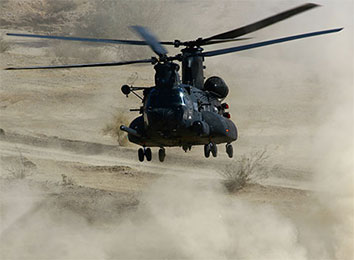MH-47G Chinook Helicopter
The MH-47G Chinook is an advanced heavy-lift helicopter that is manufactured by Boeing and operated by the 160th Special Operations Aviation Regiment (SOAR), or 'Night Stalkers'.

MH-47 - Crew
The MH-47s are typically crewed by 5 Night Stalkers:
- Pilot
- Co-pilot
- 3 x crewchiefs/aerial gunners
MH-47 Roles
160th SOAR Chinooks are flown in the heavy assault role. This includes the insertion, extraction of Special Operations Forces. The aircraft can also be used in the resupply role. MH-47s may also be employed in so-called 'fat cow' operations in which they are fitted with additional internal fuel bladders and deployed as a static, on the ground, refueling point for other air assets. Another role for the MH-47 is to act as an airborne C2 (command and control) platform.
MH-47 was the only US Army helicopter capable of supporting Special Operations in the higher mountainous regions of Afghanistan and as such played a major role in that theater.
MH-47 - Variants
The 160th SOAR have operated several flavors of MH-47 during its history
MH-47D
An early model, built around the CH-47D airframe brought into service with the Night Stalkers in the mid-eighties. Initially lacking many of the refinements added to later birds, many MH-47Ds have been steadily improved with better engine control systems, refueling probes. All of the 11 MH-47Ds once in the 160th SOAR inventory have now been upgraded to MH-47G standards.
MH-47E
The 'Echo' is similar to the MH-47D but with more powerful engines (T55L-714 vs the D model's T55-L712), enhanced management software, improved fuel capacity via integral fuel tanks and more advanced defensive avionics. The E model helicopters have been in service with the 160th SOAR since 1993.
MH-47G
The 'Golf' variant is the most current and sophisticated MH-47 in service. The MH-47Gs in the Night Stalker's inventory are either new build airframes or MH-47E airframes that have been remanufactured to Golf standards. The rebuilt airframes include new electrical and hydraulic lines.

Design Features
The MH-47G uses 2 T55-GA-714A engines with IES-47 Infrared Exhaust Suppressors fitted to reduce the helicopter's IR visibility. Enhanced Air Transportability Pylons allow for faster re-build of an air-transported helicopter. 'Fat tanks' are fitted in the form of enlarge fuel sponsoons that extend the MH-47G's range. An extendable refueling probe allows the aircraft to take on fuel mid-air from compatible fixed-wing tankers. The airframe a belly hatch, bubble windows along each side and a rear ramp that can be used to load and off-load troops, supplies and vehicles. A rescue hoist/winch is mounted above the starboard-side forward door. A gunner's window / firing port is found on the port side fuselage, rear of the flight deck. A door is on the opposite side, which has a rescue hoist mounted over it.

MH-47G Cockpit
The MH-47G features a glass digital cockpit that is compatible with night vision goggles. It features 5 6x8 inch liquid crystal multi-function display (MFD) screens and 2 control display units (CDUs). The cockpit is to Common Avionics Architecture System (CAAS) standard, sharing the same processing and display units as the MH-60M Black Hawk. The CAAS was developed for the Night Stalkers then adopted by the Army and is now present throughout the Army's Chinook and Black Hawk fleets.

The cockpit also features digital moving map display, dual MIL-STD-1553 digital databuses, AN/ASN-137 inertial doppler navigational set, CP1516-ASQ automatic target hand-off system, AN/ASN-149(V)2 GPS receiver and Rockwell Collins AN/ARN-149(V) low-frequency automatic direction finder.
MH-47G Sensors
- AN/ZSQ-2 EOSS - A foward-looking infrared (FLIR) and electro-opitcal camera mounting in a bubble under the helicopter's chin enables the pilots to fly low level, at night and in marginal weather
- AN/APQ-174B Multi-mode Radar 'Silent Knight' multi-mode radar
the MH-47's radar features terrain-following, terrain-avoidance and weather detection modes

MH-47G Communications Gear
- AN/ARC-220 High Frequency (HF) Radio
- AN/ARC-201D Single channel ground and airborne radio system (SINCGARS)
- 4x AN/ARC-231 (UHF, VHF) including 2 with satcom capability
- AN/ASN-145 AHRS Jam-resistant radios
- MTX Blue Force Tracker
- AN/APX-123 IFF Transponder
- Digital Inercommunication System (DICS)
Defensive systems
- Common Missile Warning System (CMWS)
- Suite Of Integrated Radio Frequency Countermeasures (SIRFC)
- AN/AVR-2b Laser Warning System
- XM216 Dark Flares (invisible to naked eye)
MH-47G Armaments
MH-47s are armed with M134 7.62mm electrically-operated, air-cooled gatling guns, fitted in firing the left port/ right cabin door aft of the cockpit. E/G models also have M240 7.62mm belt-fed machine guns fitted to windows towards the rear.

Extraction / Insertion Gear
Fast Rope Insertion Extraction System (FRIES)
a set of rigs that allow for thick woolen ropes to be attached to the cabin to allow for operators to 'fast rope' down from the helicopter.
- Special Patrol Insertion & Extraction System (SPIES)
Used for extracting personnel from the ground, a single rope is attached to the helicopter and lowered down. A series of rings on the rope allow operators on the ground, all wearing special harnesses, to clip onto the rope. Up to 8 fully-laden troops can be lifted off the ground and carried away using this method - Rope ladder
typically deployed through the belly hatch - Rescue hoist
electrically-powered hoist for lifting men in a harness or a litter
The MH-47 is fitted with a personnel location system (PLS) -
a radio homing system that is used to locate downed pilots via compatible emergency beacons


MH-47G Specifications
| Crew | Pilot, Co-pilot + 3 crew chiefs/gunners |
| Engines | 2xTextron Lycoming T55-4-714 Turboshaft engines |
| Dimensions | L - 15.87m W (rotor diameter) - 18.82m H - 5.59m |
| Weights | 12,210 kg (empty) 24,494 kg (max loadout) |
| Max Speed | 259 kph |
| Range | 1382 km |
| Armament | 4 gun stations (port/starboard front and rear) : 2x m134 7.62mm miniguns (front) 2 xM240D 7.62mm machine gun (rear) |
